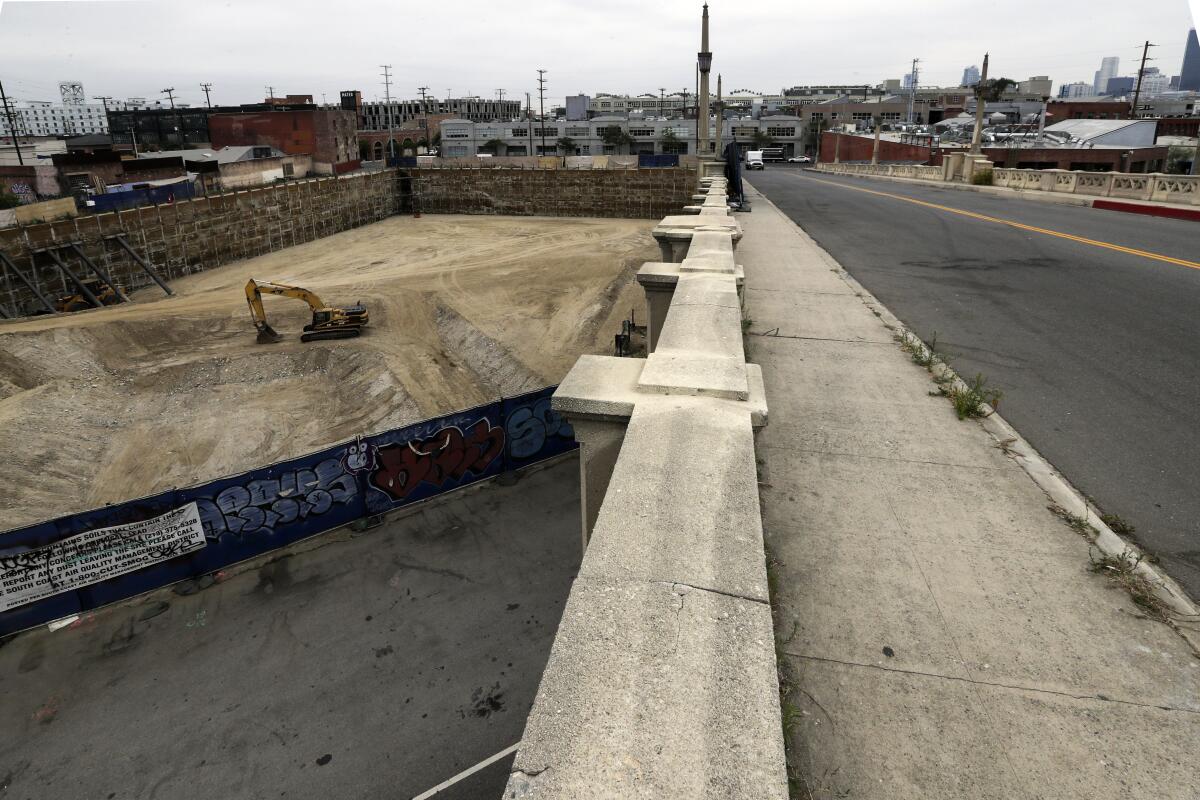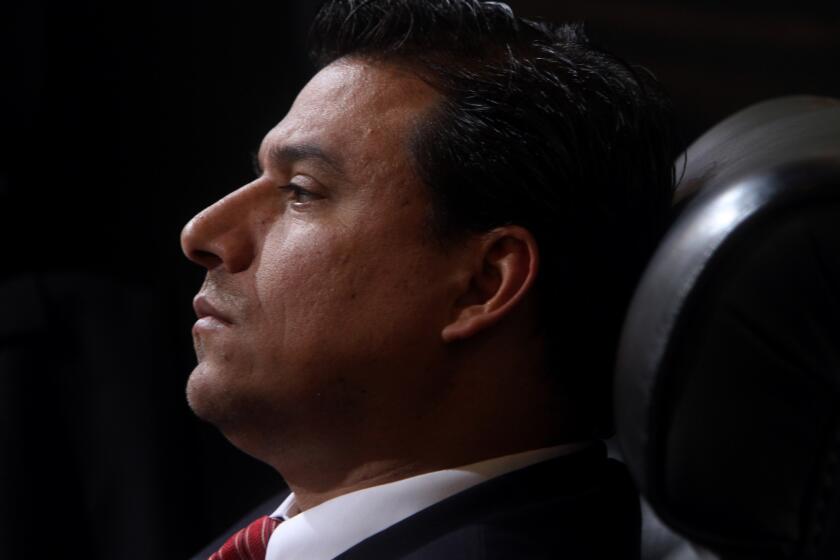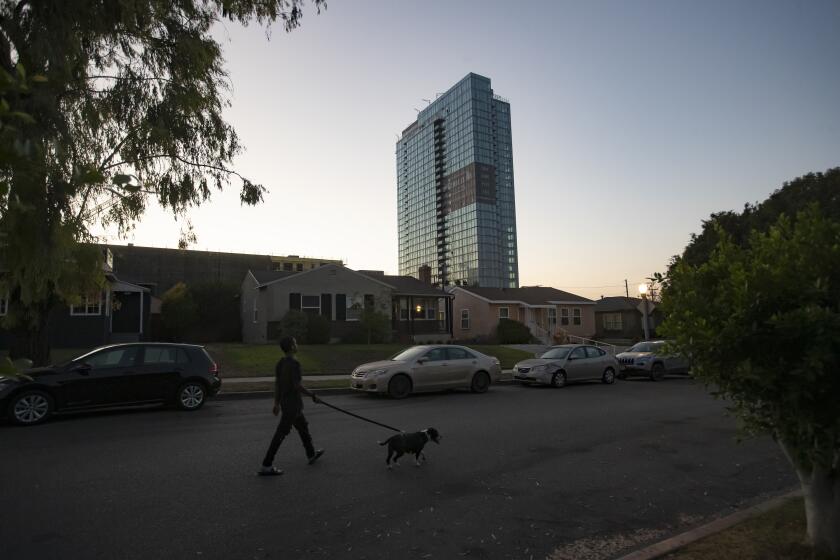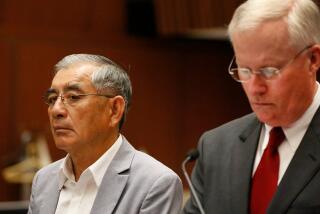Downtown developer will pay $1.2 million in L.A. City Hall corruption case
- Share via
A real estate company whose 35-story residential tower is a major part of the federal bribery case against former Los Angeles Councilman Jose Huizar has agreed to pay $1.2 million to resolve its portion of the investigation, prosecutors said Thursday.
Carmel Partners, which is developing the tower known as 520 Mateo in L.A.’s Arts District, agreed to make the payment as part of a non-prosecution agreement reached last month. The three-year agreement will spare the company from becoming a defendant in the corruption case.
The agreement contained an allegation against Huizar that has not appeared in previous indictments. At one point in 2018, the document said, Huizar asked a Carmel executive if he would provide $250,000 in exchange for a reduction in the amount the company paid into a fund for affordable housing.
The executive did not respond to the request, which was made during a campaign fundraiser, according to the agreement. An attorney for Huizar declined to comment on the allegation.
The document filed by prosecutors outlining their agreement with Carmel Partners. The firm will pay a $1.2-million fine.
Prosecutors said they backed the non-prosecution agreement, in part, because the San Francisco developer had cooperated with investigators and fired two figures involved in the case — lobbyist Morrie Goldman, who has since pleaded guilty, and an employee listed in federal filings as Executive M.
“We are pleased to have reached a resolution of the government’s investigation without any filing of charges,” the company said in a statement. The non-prosecution agreement “and statement of facts that we signed does not include any admission or finding of criminal wrongdoing by the company or its executives.”
As part of the agreement, Carmel Partners instituted a new policy prohibiting the company from making political contributions to state or local candidates or doing any fundraising or bundling for candidates and political action committees.

The 520 Mateo tower figured heavily in the case against Huizar, who has pleaded not guilty to charges of racketeering, bribery and money laundering. Prosecutors described the development as a clear example of the public harm caused by alleged bribe taking at City Hall.
Investigators said Huizar reduced the amount of affordable housing required inside the development after receiving key financial benefits, including donations from Carmel to his favored political committees. Huizar also acted after being told that Carmel would provide $75,000 to a committee that would support the short-lived City Council campaign of his wife, Richelle Huizar, according to the federal indictment in the case.
Prosecutors allege that L.A. City Councilman Jose Huizar schemed with the developer of an Arts District project and its lobbyist to provide “direct and indirect financial benefits” to the councilman in exchange for his help at City Hall.
The City Planning Commission originally recommended that 11% of the housing units at 520 Mateo go to “very low income” households. Huizar pushed instead for only 6% of the units to go toward “moderate income” residents and that 5% of its commercial floor area be reserved as affordable workspace.
That amounted to roughly 24 fewer units of affordable housing.
The actions taken by Huizar on behalf of the 520 Mateo project saved Carmel $14 million, prosecutors said last year.
Pete White, who heads the anti-poverty group Los Angeles Community Action Network, said prosecutors should have negotiated a tougher penalty. Huizar’s district, he said, desperately needs more low-income housing.
“This is not a fair agreement,” he said. “We need the whole $14 million.”
In the agreement, prosecutors also said the developer had paid $7,200 to obtain information on a person who had been “causing problems” for Huizar’s family. That research was placed in an envelope and handed to Huizar at a 2018 fundraiser.
The massive development at Jefferson and La Cienega boulevards got a big push from Councilman Herb Wesson.
So far, the corruption probe has resulted in guilty pleas from former Councilman Mitchell Englander, former Huizar staffer George Esparza and two businessmen who sought Huizar’s support for real estate projects planned in his district.
Prosecutors also have charged Raymond Chan, a former deputy mayor under Mayor Eric Garcetti, with bribery, fraud and conspiracy. He has pleaded not guilty.
The 520 Mateo project is not the only one where Carmel Partners persuaded city leaders to roll back affordable housing requirements.
In 2016, Carmel Partners won approval of the 30-story Cumulus District project in South Los Angeles. As part of that process, Councilman Herb Wesson and his colleagues removed a requirement sought by the city’s Planning Commission that would have required the project to include 55 units of affordable housing — the kind that has restricted rents for 55 years.
That project has not been part of the Huizar case.
Times staff writer Joel Rubin contributed to this report.
More to Read
Sign up for Essential California
The most important California stories and recommendations in your inbox every morning.
You may occasionally receive promotional content from the Los Angeles Times.













